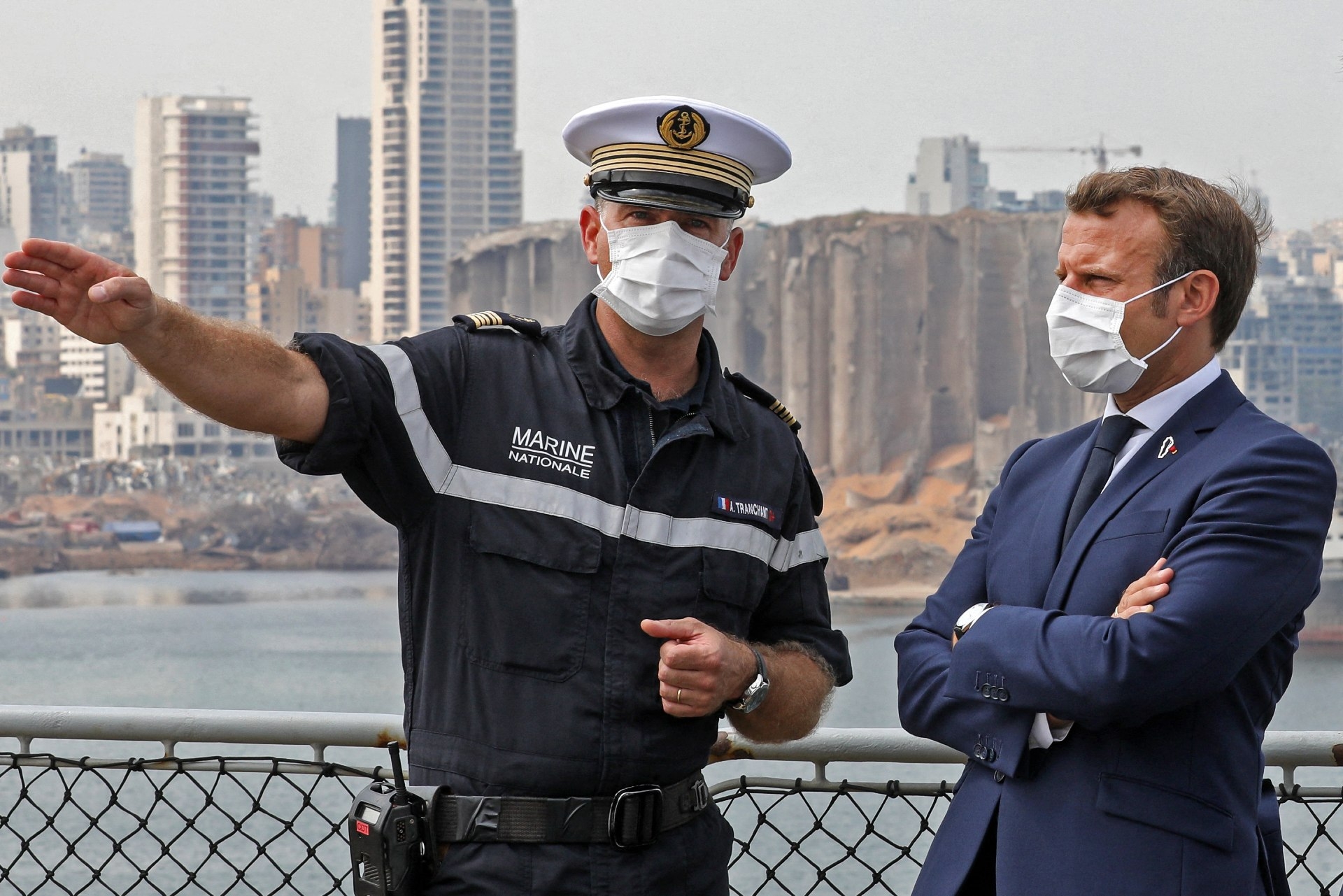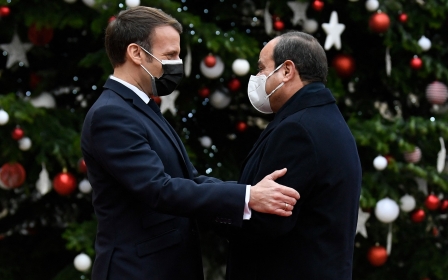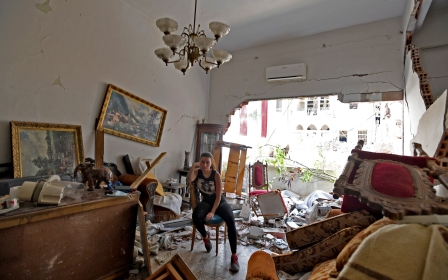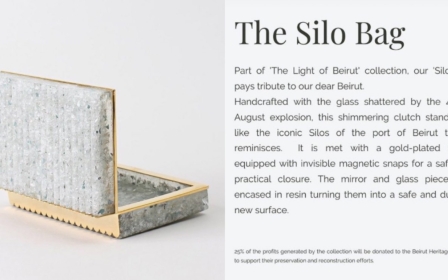Macron's Covid-hit visit was never going to be the tonic Lebanon needs

For anyone believing the formation of a new Lebanese government hinged on Emmanuel Macron’s planned visit to Beirut next week, his Covid-19 contraction was a bad diagnosis for Lebanon, not just for the French president.
But in truth, observers say, political wrangling over government formation was set to rumble on indefinitely, regardless of Macron's in-person cajoling.
Next week was slated to be the president's third visit since the 4 August explosion in Beirut's port, which tore through the capital and precipitated the resignation of Prime Minister Hassan Diab and a call for widespread reform.
'The cancellation of Macron's visit has no clear effects yet, taking into consideration the minimal effect his initiative had on the cabinet formation and the situation in general'
- Adham Hassanieh, Li Haqqi
A diplomatic source told Middle East Eye Macron was set to return around 22 December.
The trip would have seen him follow up on France's as-yet unsuccessful attempts to convince Lebanon's politicians to establish a government that would implement structural and economic reforms the international community has conditioned in exchange for much-needed financial aid.
New MEE newsletter: Jerusalem Dispatch
Sign up to get the latest insights and analysis on Israel-Palestine, alongside Turkey Unpacked and other MEE newsletters
Unlike previous visits since the devastating Beirut blast, the build-up before another Parisian inspection did not make headlines.
There is a reason why.
"The cancellation of Macron's visit has no clear effects yet, taking into consideration the minimal effect his initiative had on the cabinet formation and the situation in general," said Adham Hassanieh, from independent political party Li Haqqi.
Third time's a charm?
Macron's first visit was two days after the Beirut port explosion, which killed around 200 people and wounded thousands.
The French president surprised residents and volunteers in Beirut's devastated Gemmayzeh neighbourhood, and was met with cheers by some and anti-government slogans by others.
Macron said he wasn't there to prop up the Lebanese government: he promised that French aid wouldn't be syphoned off into the country's corruption networks, and that he would push for a united pact among Lebanon's rulers to implement reforms and make the country viable again.
Lebanon is reeling from a horrific economic crisis over the past year that has left at least half the population living in poverty and the national currency a small fraction of its value.
It has unsuccessfully negotiated for a bailout with the International Monetary Fund (IMF), and the international community is not willing to give a penny in economic aid without financial and structural reforms.
Some saw Macron's first visit and more unrelenting rhetoric towards the Lebanese authorities as encouraging. However, his second visit less than a month later was lacklustre to say the least, despite presenting a reform blueprint and even threatening the use of sanctions against the country's corrupt ruling class.
But the visit was seen by many as a mere "publicity stunt".
"Ever since his first visit, when there was a glimmer of hope, nothing has really changed," Mariam, a 22-year-old engineer, told MEE.
Mariam's office was destroyed in the Beirut Port blast in August, but she was luckily working from home because of a countrywide coronavirus lockdown.
"Why would I get my hopes up when I’ve already been disappointed?" she asked with a shrug. "This is Lebanon, and absolutely nothing is guaranteed."
Since Macron first visited, Lebanon has characteristically locked itself in a cataclysmic political paralysis.
Diab resigned a week after the blast, admitting in his harrowing speech that Lebanon's "corruption is greater than the state".
Meanwhile, Lebanon's ambassador to Germany Mustapha Adib was chosen to succeed Diab later that month with the French president's blessings - only for him to resign a few weeks later.
Since mid-October Saad Hariri, former prime minister and scion of a political dynasty, has been picked for another stint in the Grand Serail but is as yet unable to form a government.
A senior official from the Hariri-led Future Movement told MEE that government formation remains at a standstill, primarily blaming President Michel Aoun and his son-in-law, Gebran Bassil, who leads the Free Patriotic Movement party.
No one expects the French initiative
Macron's infamous "French initiative" has never been made public.
However, it reportedly includes several reiterations of reformist commitments Lebanon has made to the international community but not acted upon, such as resuming talks with the IMF, setting up its anti-corruption framework, and resolving its electricity issue.
Back in September, Lebanon was given two weeks to form a government and pass these reforms. Almost four months later, nothing has been achieved.
French foreign minister Jean-Yves Le Drian recently compared Lebanon's political and economic freefalling to the Titanic - "and there isn't even music". But could the same be said about the French initiative?
'Lebanese politicians have demonstrated that they will not be hurried along in this process, even as Lebanon hurtles into the abyss'
- Maha Yahya, analyst
Arab Reform Initiative senior fellow Jamil Mouawad believes so, saying that Macron put all his eggs in one basket by focusing almost solely on Lebanon's rulers
"Even if they form a government, he had already given them an ultimatum, visited once, and then visited again," Mouawad told MEE. "He didn't give way to the general mood of the country that they wanted to change and change the system."
As far as Maha Yahya, director of the Carnegie Middle East Centre is concerned, Macron or not, the Lebanese ruling class is far too stubborn to be swayed into reform or rapid government formation.
"Lebanese politicians have demonstrated that they will not be hurried along in this process, even as Lebanon hurtles into the abyss," Yahya told MEE.
"They repeatedly demonstrate their private interests trump those of the nation and of the Lebanese, no matter the circumstances."
Middle East Eye delivers independent and unrivalled coverage and analysis of the Middle East, North Africa and beyond. To learn more about republishing this content and the associated fees, please fill out this form. More about MEE can be found here.





